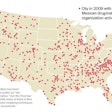There is no "nice" way to arrest a potentially dangerous, combative suspect. The police are our bodyguards, our hired fists, batons, and guns. We pay them to do the dirty work we're too afraid, too unskilled, or too civilized to do ourselves. We expect them to keep the bad guys out of our businesses, cars, and houses, out of our face.
We want them to "take care of the problem." We just don't want to see how it's done."—Professor Charles H. Webb, California State University Long Beach
During the LAPD Rampart investigation, people with a self-serving political agenda and some anti-police "do-gooders" solicited gang members from 18th Street and Mara Salvatrucha and their families to file complaints against LAPD Rampart Division Officers.
They concentrated on the CRASH Gang Officers. They used a church to give classes on how to make a police complaint and encouraged the filing of these complaints whether they had any credibility value or not. The great majority of these complaints proved to be unfounded.
Today, gang members nationwide have learned this tactic and have continued to utilize it to shut down effective gang cops and gang units. Groups like the National Prison Project, National Police Accountability Project, the American Civil Liberties Union, and the National Lawyers Guild have intimidated Law enforcement to the point that officers are overly sensitive to citizen complaints.
Departments often make no distinction between citizen and suspect complaints, even when the obvious facts don't support the complaint. Little discretionary consideration is given, even if the complaining party has a history of making unfounded and false allegations of police misconduct.
Administrators say that we must err on the side of caution or we might have a chilling effect on citizens who need to file legitimate complaints.
But some complaints defy common sense and law enforcement very rarely files criminal "false reporting" charges against a complaining party when the allegations are found to be false. The criminal prosecution of false reporters might have a good chilling effect on this false reporting.
I believe that about 20 percent of any police force does 90 percent of the work. The remaining 80 percent of the force will do just enough to get by. In your criminal justice career, you will see the same hard-working 20 percent throughout your career in your department. The 20-percenter is the type of cop who seeks assignments like narcotics, SWAT, and working gangs. He doesn't do it for the money. And she accepts these more demanding assignments because she loves the work. But unfortunately, "no good deed goes unpunished."
Because this type of officer does more, the 20-percenter will naturally be the target of more complaints. He will get to know the real troublemakers in the community, and they will get to know him as well. And she will not be an anonymous uniform, but someone well known to the gangs who affectively intervenes in their criminal activity on a regular basis.
When I worked my old neighborhood in Willowbrook and Compton, the gang members unable to remember my name "Valdemar" began calling me "Baltimore." Even though I wore a name tag on my uniform and signed each ticket and booking slip with my name and employee number, they persisted in calling me "Baltimore."
One day I arrested a Hispanic gang member from the Compton Tortilla Flats gang for narcotics possession. Of course, he claimed that the drugs I found in his car were not his, but I had him laughing and joking freely about his criminal life as I drove him back to the station to book him. He said, "You know, you are alright deputy." "But you have some deputy named Baltimore who works here who beats up my homeboys when they are handcuffed and plants guns and dope on them."
I'm sure this explained some of the numerous unfounded complaints I got while I was working in that neighborhood. The gang members must have shared exaggerated stories of their arrests with other homeboys and used the name "Baltimore" to identify whatever cop treated them badly. All I know is it wasn't me.
As a gang cop, if the gang members don't know you, or haven't maybe given you a nickname, then you are not doing your job.
In Sergeant Supervisory School, we learned that administrators tend to heap especially sensitive and difficult assignments on the already overloaded 20 percent of officers who do the majority of all police work rather than the 80 percent of officers who skate. This is because they expect these hard-working cops to do the job in an effective and timely manner. But the 80 percent will require close supervision and intensive motivation to do the same job. In other words, the supervisors will be required to work harder.
Negative citizen complaints also work against gang cops in performance evaluations and promotions. In these labor-intensive assignments Officers are forced to neglect family time, vacations, and studying for promotional exams. In contrast, officers working administrative, and other 9-to-5 assignments have the advantage of time to study and even form study groups, and rarely are hindered by administrative investigations or citizen's complaints. They get good performance evaluations and office recommendations for promotions.
This results in department administrations that understand the policy manual, but don't have a clue about how to implement policy effectively in the field. Officers who qualify in court and have earned the title "expert" in narcotics, tactical operations, and gang homicides are passed over for someone with a 100 point office recommendation.
The most damning complaint thrown regularly by community activists is the accusation of racism. Gang members have always played the race card. However it is the gangs made up primarily of the same race that murder and terrorize an ethnic community.
Please take the time to look at the community activists who hurl these racial discrimination charges at police. These "leaders" act to protect the rights of racist criminal gangs over the rights of the community they victimize, and they have been doing so since the 1960s. It is time to swing the pendulum back the other way.













